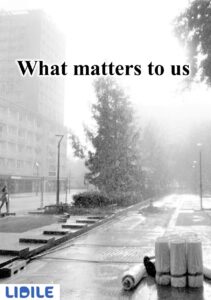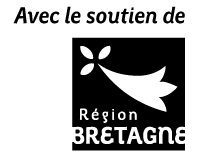LIDILE – WHAT MATTERS TO US – CONCEPT NOTE

A research project financed by the Rennes city council under number : 22CO909
A research project financed by Bretagne Region under the number: SAD_2023_UR2_CQNC_Ce qui nous concerne
A research project financed by Zone Atelier Armorique
A research project financed by Univer.Cité
‘What Matters to Us’ is a research project that aims to value and archive stories collected in associations, in social spaces and meeting places in the city of Rennes, in Bretagne, France. Through peoples’ accounts of experience, the project wishes to map, and preserve, the diverse voices that enrich civil society.
Why would one want to collect and study stories? There are perhaps three answers to this question. Firstly, stories and oral history are often fleeting and difficult to retain. Even though we are immersed in speech throughout the day, our words, and those of others, disappear forever if not recorded and archived. If they are not kept alive we lose the crispness of evocation even of key conversations that have forged new initiatives, identities and endeavours. Secondly, it takes work to safeguard a story’s meaning and to be able to transfer it to others. The words we speak are context specific. What feels so coherent and convincing in one place, can loose its meaning and motive power in another. Thirdly, collecting stories is a way of valuing our different ways of speaking and the discourses that circulate in our contemporaneity. It is interesting, and instructive, to compare what we said yesterday, under other circumstances, with what (and how!) we say it today.
In terms of research into (socio)linguistics, although new social configurations, new urban fabrics and new behaviours bring into the world new ways of talking and being, there are relatively few ethnographic corpuses. Linguistically, in the course of just a few years, important variations can occur. Documenting and preserving these changes is one response to the need for reciprocity between researcher and researchee. But participating in ‘What Matters to Us’ has other positive impacts. The stories collected by the project can be valued, used and transferred by their tellers. In this way an association can revisit some of its founding moments on its website, for example, or talk about them during a seminar. Working together on story crafting is a way of better understanding oneself and the meanings that one attributes to the personal and professional events of one’s life. By participating in the project one can hope to gain time for self-reflection, sustain orality, share one’s experience of the world and value one’s association.

